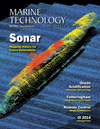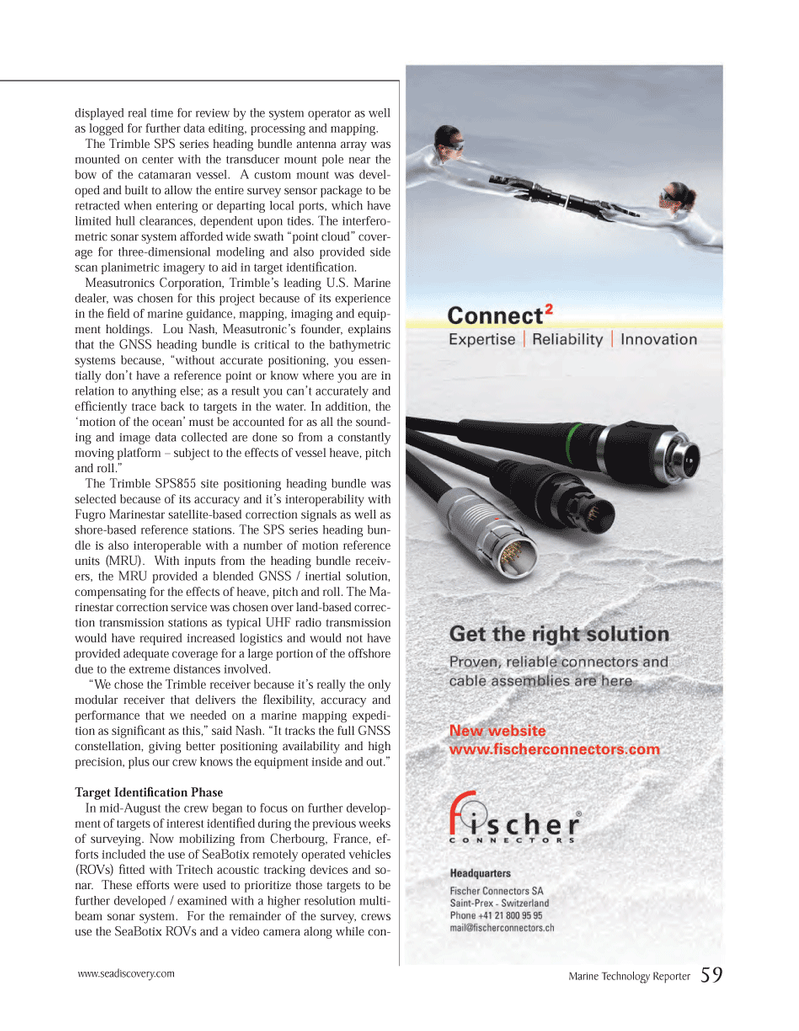
Page 59: of Marine Technology Magazine (March 2014)
Instrumentation: Measurement, Process & Analysis
Read this page in Pdf, Flash or Html5 edition of March 2014 Marine Technology Magazine
displayed real time for review by the system operator as well as logged for further data editing, processing and mapping. The Trimble SPS series heading bundle antenna array was mounted on center with the transducer mount pole near the bow of the catamaran vessel. A custom mount was devel- oped and built to allow the entire survey sensor package to be retracted when entering or departing local ports, which have limited hull clearances, dependent upon tides. The interfero- metric sonar system afforded wide swath ?point cloud? cover- age for three-dimensional modeling and also provided side scan planimetric imagery to aid in target identi cation. Measutronics Corporation, Trimble?s leading U.S. Marine dealer, was chosen for this project because of its experience in the eld of marine guidance, mapping, imaging and equip- ment holdings. Lou Nash, Measutronic?s founder, explains that the GNSS heading bundle is critical to the bathymetric systems because, ?without accurate positioning, you essen-tially don?t have a reference point or know where you are in relation to anything else; as a result you can?t accurately and ef ciently trace back to targets in the water. In addition, the ?motion of the ocean? must be accounted for as all the sound- ing and image data collected are done so from a constantly moving platform ? subject to the effects of vessel heave, pitch and roll.? The Trimble SPS855 site positioning heading bundle was selected because of its accuracy and it?s interoperability with Fugro Marinestar satellite-based correction signals as well as shore-based reference stations. The SPS series heading bun- dle is also interoperable with a number of motion reference units (MRU). With inputs from the heading bundle receiv- ers, the MRU provided a blended GNSS / inertial solution, compensating for the effects of heave, pitch and roll. The Ma- rinestar correction service was chosen over land-based correc- tion transmission stations as typical UHF radio transmission would have required increased logistics and would not have provided adequate coverage for a large portion of the offshore due to the extreme distances involved. ?We chose the Trimble receiver because it?s really the only modular receiver that delivers the exibility, accuracy and performance that we needed on a marine mapping expedi- tion as signi cant as this,? said Nash. ?It tracks the full GNSS constellation, giving better positioning availability and high precision, plus our crew knows the equipment inside and out.? Target IdentiÞ cation Phase In mid-August the crew began to focus on further develop- ment of targets of interest identi ed during the previous weeks of surveying. Now mobilizing from Cherbourg, France, ef- forts included the use of SeaBotix remotely operated vehicles (ROVs) tted with Tritech acoustic tracking devices and so- nar. These efforts were used to prioritize those targets to be further developed / examined with a higher resolution multi- beam sonar system. For the remainder of the survey, crews use the SeaBotix ROVs and a video camera along while con- www.seadiscovery.com Marine Technology Reporter 59MTR #2 (50-65).indd 59MTR #2 (50-65).indd 592/21/2014 11:31:17 AM2/21/2014 11:31:17 AM

 58
58

 60
60
